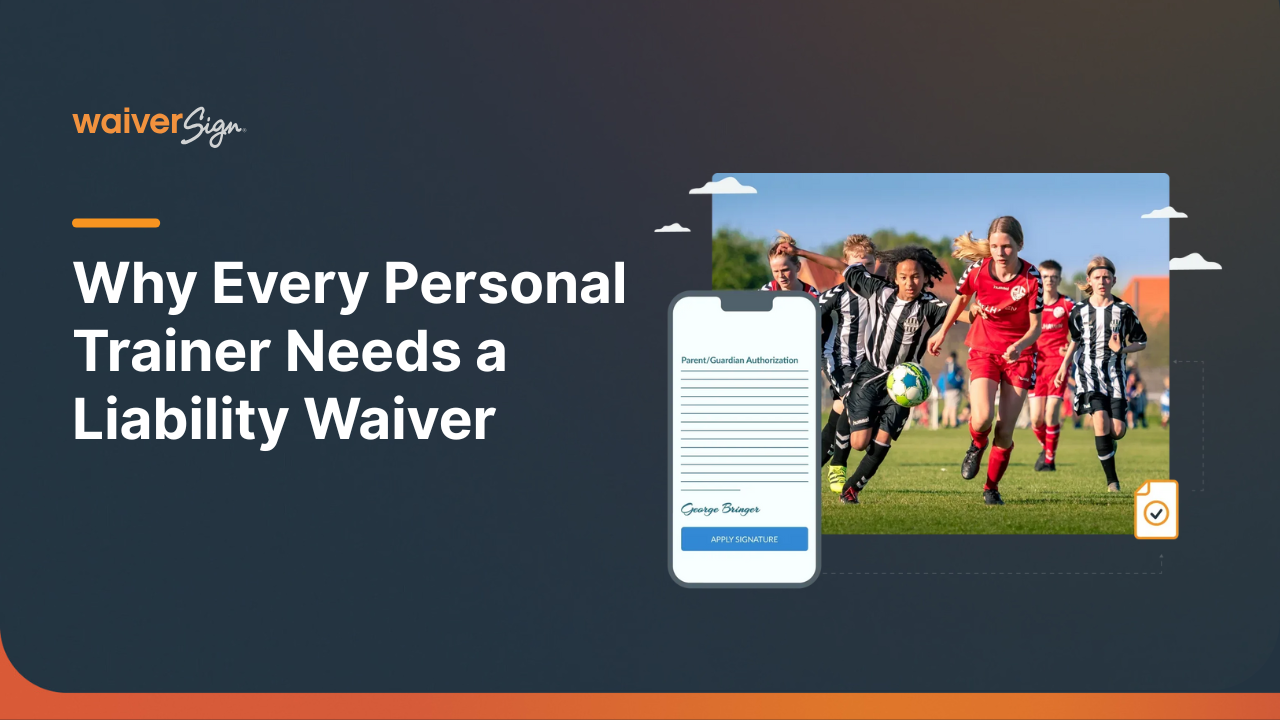The Role of Waivers in Group Fitness & Bootcamps
Nikki DeSantis
The Role of Waivers in Group Fitness & Bootcamps
Group fitness and bootcamp workouts have exploded in popularity. They’re fun, motivating, and often push people to perform at their best. But with that energy and intensity comes risk. Whether you’re running outdoor bootcamps, cycling classes, or high-intensity group training, the potential for injuries and misunderstandings is always there.
That’s why fitness liability waivers play such a critical role in protecting both participants and fitness professionals. A well-structured waiver sets expectations, reduces legal risk, and fosters trust between trainer and client.
Disclaimer: This article is for informational purposes only and is not legal advice. Always consult with a qualified attorney to ensure your waiver is valid and enforceable in your area.
Why Waivers Matter in Group Settings
Unlike one-on-one personal training, group classes introduce more variables. Different fitness levels, exercise modifications, and the fast pace of classes make it harder to monitor every participant closely. Even when instructors give clear safety cues, accidents can happen.
A fitness liability waiver ensures that participants acknowledge these risks before they start. It’s not about scaring clients away, it’s about transparency and professionalism. By signing, participants confirm they understand the nature of the activity and agree not to hold the trainer or facility responsible for ordinary risks.
For a deeper look at how waivers protect group fitness classes, take a look at our gym liability waiver guide.

Setting Expectations Builds Trust
Trust is everything in the fitness world. A waiver isn’t just legal paperwork, it’s a communication tool. It outlines what participants can expect and what’s expected of them.
For example, it may highlight:
- The importance of disclosing medical conditions
- The participant’s responsibility to listen to instructions
- The risks of high-intensity or outdoor training environments
When used well, a waiver shows clients you’re organized, thoughtful, and committed to their safety. That confidence can actually make your classes more appealing.
Different Waivers for Different Needs
Not all fitness programs are the same. A group fitness class waiver may differ from a bootcamp waiver, depending on setting and activity level.
- Bootcamp waiver: Often includes outdoor risks such as uneven terrain, weather conditions, and unpredictable environments.
- Group fitness waiver: More common in gyms or studios, addressing equipment use, crowded spaces, and varied participant skill levels.
If you operate a facility that offers multiple types of programs, your waiver may need to cover several scenarios at once. Platforms like WaiverSign’s gym and fitness liability waivers make it easy to create customizable, branded digital waivers that fit all your offerings.
The Shift to Digital Waivers
Paper forms are easy to lose, hard to track, and inconvenient for both staff and clients. Digital waivers simplify the process by allowing participants to sign from their phone before arriving. This reduces check-in times, eliminates storage issues, and ensures all signed documents are secure and easy to retrieve.
For businesses running multiple sessions a day, especially high-turnover classes like spin or yoga, digital waivers aren’t just convenient, they’re a necessity.

FAQs About Group Fitness Waivers
Do I really need a waiver for every group fitness class?
Yes. Even if classes are low-impact, waivers protect you from liability and make risks clear to participants.
Can one waiver cover multiple bootcamp sessions?
Often, yes. Many trainers use a waiver that applies to an entire program or membership period, not just a single class.
What should be included in a group fitness waiver?
Key elements include assumption of risk, release of liability, medical disclosures, and participant responsibility to follow instructions.
Are digital waivers legally valid?
Absolutely. When properly set up, digital signatures are just as enforceable as pen-and-paper ones.
How do I make my waiver fit both group classes and personal training?
Use a template that can be customized for different services. Many trainers adapt one master waiver to cover both one-on-one and group programs.
Protecting Your Classes and Clients
A
fitness waiver is more than a legal safeguard. It’s a way to show professionalism, protect your business, and set the tone for a safe and positive workout environment. Whether you’re leading a high-energy bootcamp in the park or running structured studio classes, the right waiver will keep both you and your clients on the same page, so everyone can focus on the workout.

See If WaiverSign Works For You
Don't wait to make the next step in streamlining your business.






























